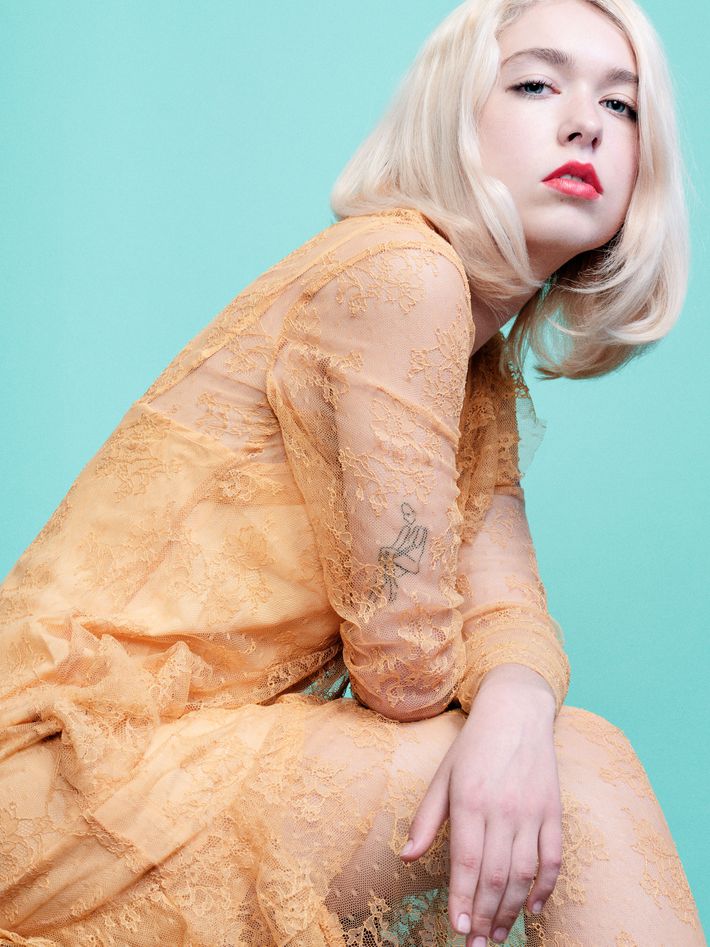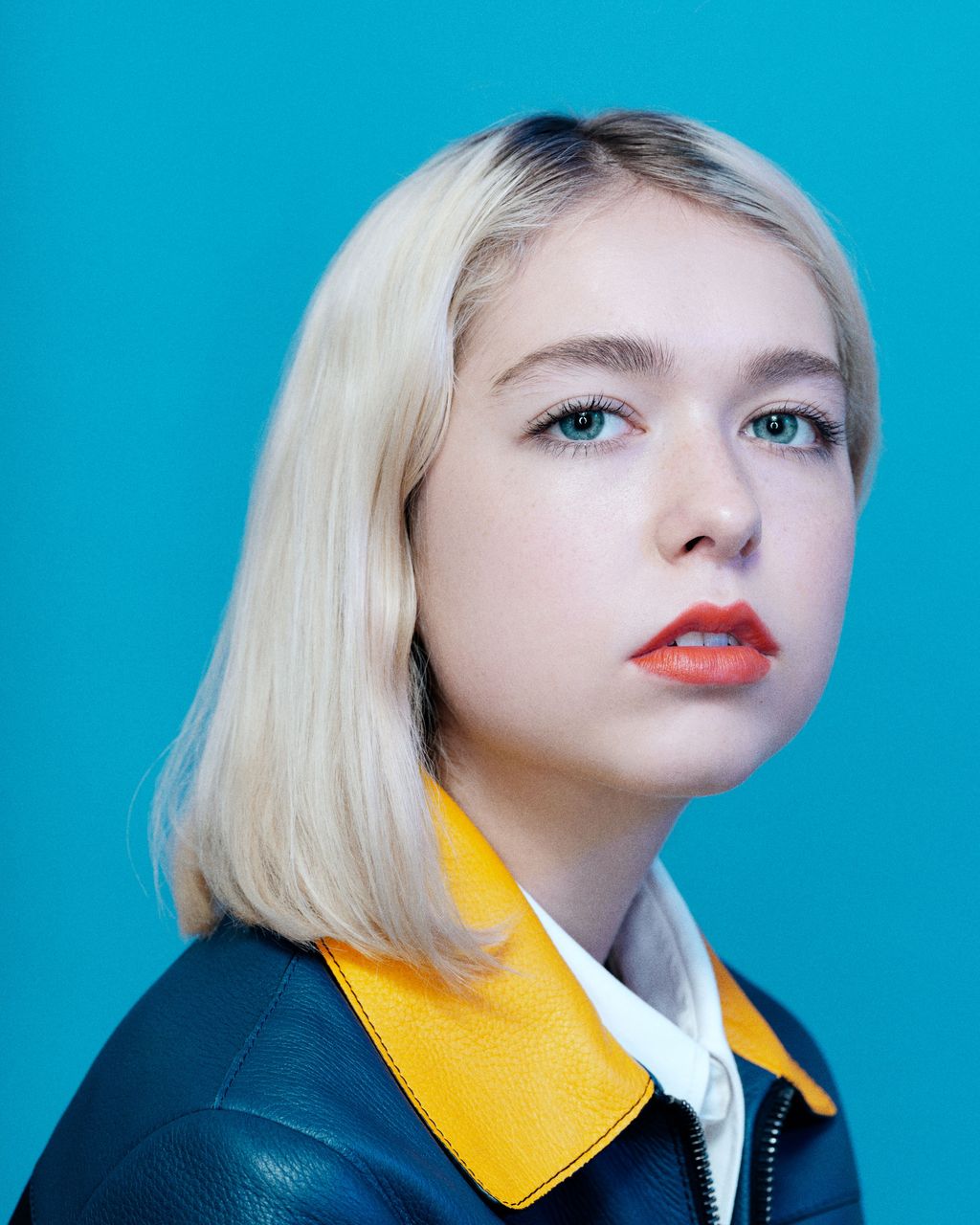We all have a chronological age — a literal number of years we’ve spent on this Earth — but that’s not always the age we feel. You can be 22, but feel spiritually 45. You can be 82 and feel 13. Recently I discovered the actual, legitimate psychological term for this experience: Felt Age. Generally I’m a chronological 32 and a felt 26, but sometimes the right song can take me back to more like 16.
Such was the case the morning I first heard “Pristine,” the lead single on Snail Mail’s debut album, Lush. It was a Sunday; I was lying in bed; I was mad at some dude. I felt dead inside. But then, pretty soon, I was texting everyone else who was awake: “I’m really hungover and I’m mad at some dude and I feel dead inside. But have you heard this song?” Snail Mail is the other side of the Carly Rae Jepsen coin, in terms of teenage feelings — instead of reliving the sweet, frothy energy of being 16, Snail Mail offers the chance to vicariously slam your bedroom door and yell I’M NEVER COMING OUT AGAIN. Lush is a startlingly good debut, a lean ten-song sprint through the emotions of adolescence — indifference, disappointment, confusion, hope — that leaves listeners with the dizzying sensation of just having reexperienced ages 15–19 again in under an hour. And 16, as it happens, is about the age Lindsey Jordan was when she wrote most of the songs on the album.
“Pristine” is a self-consciously, self-indulgently melodramatic track, the now-19-year-old Jordan tells me when we meet at Music Hall of Williamsburg before her Brooklyn show: “I’m being sarcastic, but I guess it’s based on real melodrama.” When she sings “I’ll never love anyone else” over and over again in her clear, heavy voice, it sounds like she means it, even though she really doesn’t. She’s a step removed from the reality that inspired the song. Which gets at the tricky thing about Snail Mail: She conjures something raw, but she does it through a self-aware mastery of her craft.
I find myself discussing all of this with Jordan in the backstage dressing room, while she tools around on her metallic red guitar. I am talking to a person who was born in 1999, which makes her chronological age something I don’t really want to think about. Is it weird, I ask, for me to tell you that I feel emotionally attached to your songs, even though you’re so young and I’m not?
“Nah,” she shrugs, “that’s sick.”
Liz Phair is playing down the street the night of Snail Mail’s show. It’s so wild, Jordan exclaims, while exchanging texts with Liz Phair, stoked that her personal hero is blowing up her phone. Jordan is part of a cohort of wry, emotionally honest female indie rock artists, and has been anointed in some quarters as Phair’s heir apparent. Pitchfork has called her “the future sound of indie rock.”
Right now the future sound of indie rock is a little stressed out. The soundcheck didn’t go as well as as she’d wanted. Her band is nervous. She’s tightly wound, taking a quick walk through the venue to finalize everything that needs to be finalized before the show: Someone reminds her she needs to eat dinner, another person that she needs to set the lighting cues. She crosses the stage, strums a bass that rests in its stand, makes fun of one of her band members, heads to the backstage lounge, shows me the Kristen Stewart cake that her label sent her (because she loves Kristen Stewart), and turns off the cartoons someone left on TV. “These guys are always watching shows for kids,” she says. “I mean, we watch SpongeBob all the time, but what is this?” She flips it off and takes a moment to finish texting Phair. She tells me she’s just hung a poster of Exile in Guyville on the turquoise walls of her childhood bedroom.
Jordan grew up in the suburbs of Baltimore. Location doesn’t really matter, though; “the suburbs” are their own state of mind. In her case, they were less something to rebel against than a pleasant place where she could grow into herself and listen to Paramore and Coldplay, but also discover Baltimore’s DIY music scene via older friends with cars who would drive her to shows. She played hockey and in the church band and in her mom’s friend’s cover band, at a sports bars and scuzzy house parties. She was so involved in bands at such an early age that “musician” never seemed like just a noisy hobby — it was a real, viable career option, like any other you could select in What Color Is Your Parachute.
Jordan began playing guitar when she was 5 (a year earlier than most kids, she notes) and was writing songs by 8. By 13 she had a crisis of talent (“I was a terrible singer”); by 14, she had overcome that crisis and decided, “Oh yeah, I’m the shit,” as she puts it. She says this through a pursed mouth that morphs whatever Baltimore-based accent she ought to have into something that sounds like she grew up hanging out on the same Venice Beach as Kim Gordon of Sonic Youth. (Her bleached hair, navy Dickies, and perfectly worn white T-shirt enhance the similarity.) For the rest of high school, she was hurtling toward the beginnings of her career; she got asked to play a big punk festival, and formed Snail Mail. (She likes to troll people and tell them Snail Mail is her mother’s middle name, but really she just liked the way the words sound together. It’s unclear if the fact that it’s ’90s slang registers to her.) From there she recorded her first EP, then another more professional one, Habits, then she was signed to Matador Records by 17.
Lush came together over a year and half when there was “a lot going on” in Jordan’s life. She was dealing with the question of whether to go to college or pursue music — “big-kid decisions,” she says — but also with love. A lot of the album has to do with finding “the self-awareness and understanding to create space between you and a relationship because you realize that it’s not conducive to personal growth and isn’t right for you.” Jordan is 19, but her Felt Age hovers somewhere around therapist-with-a-house-in-the-Berkshires.
While the album is journal-like, it’s no fuzzy, lo-fi pile of feelings-vomit. (Not that those don’t rule, too, in their own way.) Lush is meticulous. According to Jordan, every space, breath, tone, and drum sound was deliberate — and her decision — designed to convey a specific feeling or sensation. It’s effective. And while Jordan is clear-eyed in the way she renders vulnerability, the results still elicit messy-ass feelings. That’s why it’s such a joy to listen to: Sometimes you just want a song that delivers a gut punch, and lets you feel your own overblown emotions.
Even when Jordan was playing covers at that sports bar in Baltimore, she remembers, people would come up to her and say, Your music really, like, moved me — but especially when she started playing her own songs. It’s always been flattering but also a little unsettling, she explains, since these songs were so personal to her, so rooted in her teenage life and relationships. “This press cycle has been so weird, because I’ve had to describe what the songs, like, are,” she tells me. “I had to like open-heart-surgery all of the songs. I mean, that’s not a verb.” She laughs.

Even when an artist exerts as much control as Jordan does in the studio, she still can’t determine the intense way fans will latch onto them. She shrugs: “I guess there’s space between me and what I’m writing about that kind of allows for people to add their own context.” She says it with a nonchalance, like the space means she doesn’t care. But it seems that part of her discomfort with people filling up her music with their own context is that she isn’t quite done feeling it yet herself. In every one of her songs, there’s a moment where her voice kind of catches and she sounds like she might cry. She grabs her guitar and plays me some of the moments — on “Pristine,” it’s when she hits the pre-outro and wails, “Out of everyone / who is your type of girl?”
“I have days where I don’t feel like I can get through a certain song,” she says. “They are so heavy and refine such true, up-close things. Sometimes we just won’t play a song, because I’m like, I can’t, and other times when I’m playing it, I’m like” — here she inhales sharply and closes her eyes, as if she’s just barely holding it together.
This happens the most with “Anytime,” the album’s final track. “God, every single night! It’s so personal,” she says. It’s a spare, mature song, in which she accepts that the relationship — the melodramatic one from the first half of the album — is over.
The night of her Williamsburg show, she plays “Anytime,” her eyes closed throughout. Then she hits a line — “I’m not in love with your absence / ’cause I’ve fallen so hard for the space” — and she takes that same sharp inhalation she did in her dressing room earlier. Tonight, she makes it through the song. The rest of the audience barely does.

Photography by Benedict Evans
Styled by Lindsay Peoples Wagner
Produced by Roxanne Behr
Hair and Makeup by Nicole Blais for Exclusive Artists using Tarte Cosmetics and T3 Tools
Lead image credits: Bottega Veneta leather jacket, $4,900. Miu Miu collared shirt, Price upon request at Miu Miu.
This article has been updated with the correct spelling of Lindsey Jordan’s name.

